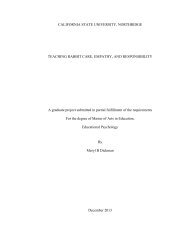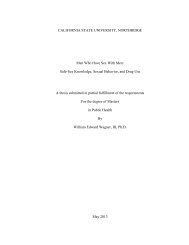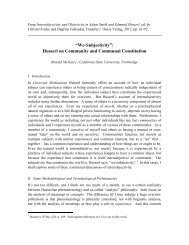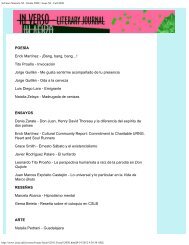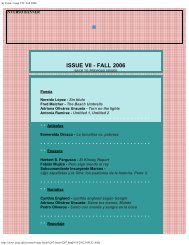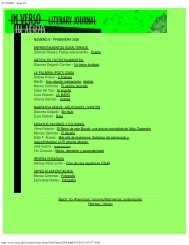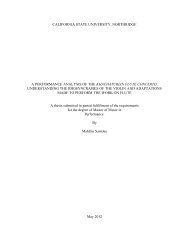Page 1 The California ""- Geographer Annual Publication of the ...
Page 1 The California ""- Geographer Annual Publication of the ...
Page 1 The California ""- Geographer Annual Publication of the ...
Create successful ePaper yourself
Turn your PDF publications into a flip-book with our unique Google optimized e-Paper software.
island <strong>of</strong> Makatea, long had <strong>the</strong> monopoly on diesel oil, receiving it from<br />
freighters from <strong>the</strong> United States that carried it in <strong>the</strong> ship's tanks in<br />
500- or 1,000-ton lots. From <strong>the</strong> main dock <strong>the</strong> oil was pumped by ship's<br />
pumps to company tanks from which it was trucked next door to <strong>the</strong> tanks<br />
<strong>of</strong> <strong>the</strong> power plant or dispensed in 50-gallon drums to small users. In 1956<br />
a bulk oil terminal and tanker berth were established at <strong>the</strong> north end <strong>of</strong><br />
<strong>the</strong> harbor to handle all oil products. 2<br />
RoLE oF LABOR<br />
Labor has a relatively important role in Tahiti's industrial picture as<br />
<strong>the</strong>re is little modern equipment or mechanization. (<strong>The</strong> power plant and<br />
<strong>the</strong> brewery are notable exceptions.) Most <strong>of</strong> <strong>the</strong> tasks, however, demand<br />
little in <strong>the</strong> way <strong>of</strong> skill. <strong>The</strong> few skills that are required, and <strong>the</strong> necessary<br />
industriousness, are provided by <strong>the</strong> Chinese residents <strong>of</strong> Papeete<br />
who in many instances are also <strong>the</strong> entrepreneurs. Labor for pay does<br />
not attract <strong>the</strong> Tahitian and, with high copra prices, is frequently unnecessary.<br />
It is, <strong>the</strong>refore, costly. Certainly no industries are attracted to<br />
Tahiti by a favorable labor situation.<br />
This leaves, <strong>the</strong>n, <strong>the</strong> market dominant among <strong>the</strong> factors <strong>of</strong> production.<br />
Tahiti's 35,000 native inhabitants, 2,000 Europeans, 5,000 Chinese<br />
and <strong>the</strong>ir demands require local production <strong>of</strong> goods that cannot be shipped<br />
pr<strong>of</strong>itably from remote sources. Thus it is <strong>the</strong> typically market-oriented<br />
industries that are conspicuous-those with final products that cannot be<br />
shipped at all such as electric power, or which are perishable and hence expensive<br />
to ship, such as ice, ice cream, and baked goods, or those that<br />
because <strong>of</strong> weight or bulk per unit <strong>of</strong> value are likewise expensive to<br />
transport-cement building blocks, cheap furniture, and <strong>the</strong> various<br />
bottled liquids.<br />
A detailed description <strong>of</strong> a few <strong>of</strong> Tahiti's manufacturing enterprises<br />
and <strong>the</strong>ir processes will illustrate more specifically <strong>the</strong> employment <strong>of</strong><br />
<strong>the</strong>se factors <strong>of</strong> production.<br />
<strong>The</strong> most abundant <strong>of</strong> <strong>the</strong> manufacturing firms on <strong>the</strong> island are <strong>the</strong><br />
bakeries (a situation that prevails also in <strong>the</strong> United States). Twelve<br />
bakeries serve Papeete, each producing from 1,000 to 1,800 loaves <strong>of</strong><br />
French bread daily. Assam's establishment in nearby Pirae is typical. A<br />
large indoor Dutch oven <strong>of</strong> stone is heated by burning wood and coconut<br />
husks within it for a few hours. After <strong>the</strong> ashes are raked out, <strong>the</strong> long<br />
loaves, which have been mixed, weighed, and shaped by hand, are inserted<br />
on a long paddle and slid <strong>of</strong>f with a quick jerk. <strong>The</strong> heat lasts for<br />
five or six lots.<br />
Finished loaves are removed by a paddle, one at a time. Some are<br />
broken by <strong>the</strong> narrow opening. <strong>The</strong> rest get <strong>the</strong> dust wiped <strong>of</strong>f <strong>of</strong> <strong>the</strong>m,<br />
<strong>the</strong>n are stacked for delivery. None are wrapped. Assam bakes twice a<br />
day, in early morning, and again at 7 p.m. for 3 a.m. delivery. One baker<br />
uses a modern oven burning fuel oil and some have machine dough<br />
mixers, but most resemble Assam's in equipment and method.<br />
2 Pacific Islands Monthly, Nov. 1956, p. 68.<br />
22



